邮轮实用英语 第一单元 第二课 Breakfast
- 格式:ppt
- 大小:4.47 MB
- 文档页数:56
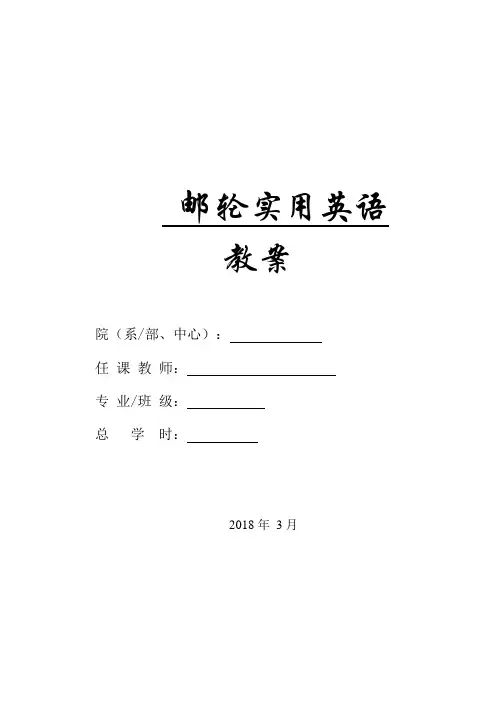
邮轮实用英语教案院(系/部、中心):任课教师:专业/班级:总学时:2018年3月《邮轮实用英语》教案《邮轮实用英语》教案第1次课课目Ordering Cocktails教学目的和要求●了解:鸡尾酒的发展历史●掌握:餐厅鸡尾酒的基本英语会话●熟悉:经典鸡尾酒英文名称及调配方式重点难点●重点:鸡尾酒英文名称●难点:餐厅鸡尾酒基本英语会话教学进程【组织教学】简单自我介绍,清点人数,课程内容,学习方式:理论+实践;平时成绩:以蓝墨云班课记录为依据。
【新课讲授】1.Lead-in师:上学期我们学习了邮轮上常见的烈性酒。
下面我们一起来回顾下:2.Presentation●Cocktail’s standard drinkware(师)提问:同学们,你们知道装鸡尾酒的杯具有哪些吗?(拿出鸡尾酒的杯具,让同学们一一识别,并一一介绍各种杯具的英文表达:Highball glass Old fashioned glass Cocktail glass Irish coffee mug hurricane glass)(宜快)●★Key words讲解课后单词以及单词的词性,同时讲授元音音标/i/、/ai/、/a:/等。
(宜慢)●▲Cocktail history让学生观看鸡尾酒历史的视频,并回答以下问题:(1)What’s the essential spirits?(2)Why does the cocktail has pretty name?《邮轮实用英语》教案第2次课课目Ordering Coffee教学目的和要求●了解:不同咖啡类型●掌握:重点单词和重点句子●熟悉:不同咖啡的英语表达和调制方式重点难点●重点:咖啡英文名称●难点:餐厅点咖啡基本英语会话教学进程【新课讲授】1.Lead-in师:我们平常或多或少会接触到咖啡,那么同学们,你们知道的咖啡有哪些?(which type of coffee do you know?)(让学生们现场分享带来的咖啡,并用英语分享各种咖啡的口感和味道,like:sweet、sour、bitter and so on.)2.Presentation●★Key words(师):讲解课后单词以及单词的词性,同时讲授部分音标等。
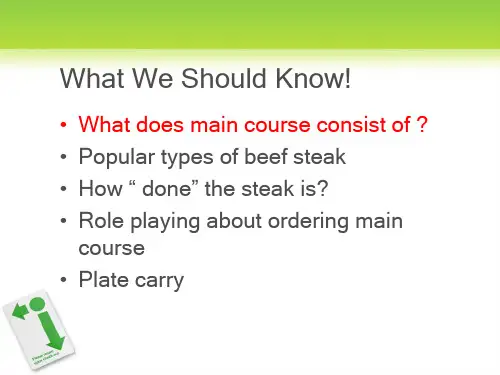
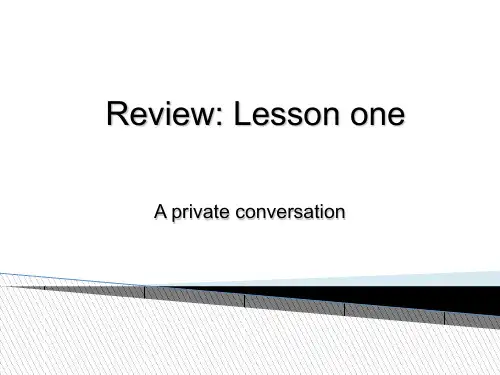
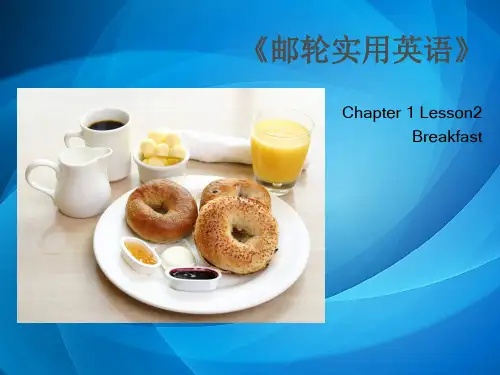
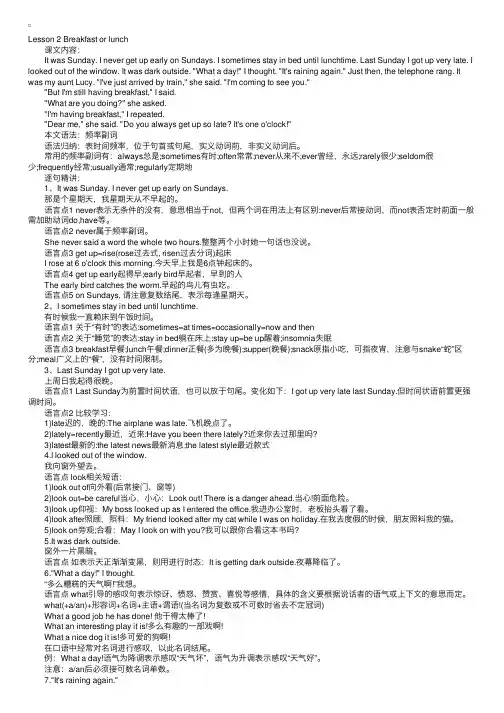
Lesson 2 Breakfast or lunch 课⽂内容: It was Sunday. I never get up early on Sundays. I sometimes stay in bed until lunchtime. Last Sunday I got up very late. I looked out of the window. It was dark outside. "What a day!" I thought. "It's raining again." Just then, the telephone rang. It was my aunt Lucy. "I've just arrived by train," she said. "I'm coming to see you." "But I'm still having breakfast," I said. "What are you doing?" she asked. "I'm having breakfast," I repeated. "Dear me," she said. "Do you always get up so late? It's one o'clock!" 本⽂语法:频率副词 语法归纳:表时间频率,位于句⾸或句尾,实义动词前,⾮实义动词后。
常⽤的频率副词有:always总是;sometimes有时;often常常;never从来不;ever曾经,永远;rarely很少;seldom很少;frequently经常;usually通常;regularly定期地 逐句精讲: 1、It was Sunday. I never get up early on Sundays. 那是个星期天,我星期天从不早起的。
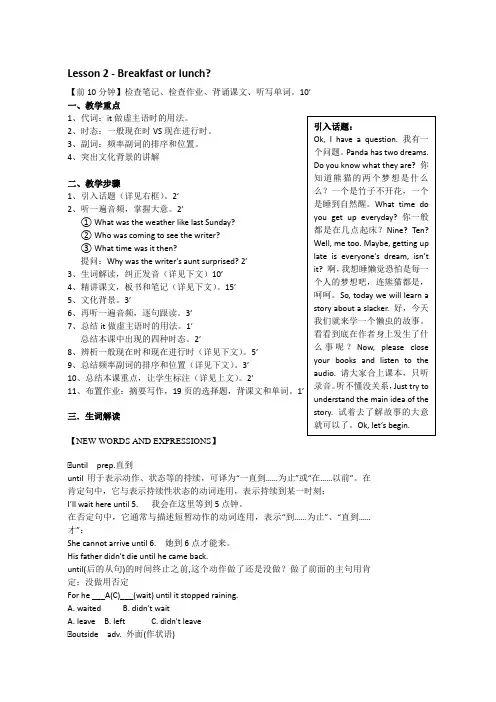
Lesson 2 - Breakfast or lunch?【前10分钟】检查笔记、检查作业、背诵课文、听写单词。
10’一、教学重点1、代词:it做虚主语时的用法。
Array2、时态:一般现在时VS现在进行时。
3、副词:频率副词的排序和位置。
4、突出文化背景的讲解二、教学步骤1、引入话题(详见右框)。
2’2、听一遍音频,掌握大意。
2’① What was the weather like last Sunday?② Who was coming to see the writ er?③ What time was it then?提问:Why was the writer’s aunt surprised? 2’3、生词解读,纠正发音(详见下文)10’4、精讲课文,板书和笔记(详见下文)。
15’5、文化背景。
3’6、再听一遍音频,逐句跟读。
3’7、总结it做虚主语时的用法。
1’总结本课中出现的四种时态。
2’8、辨析一般现在时和现在进行时(详见下文)。
5’9、总结频率副词的排序和位置(详见下文)。
3’10、总结本课重点,让学生标注(详见上文)。
2’11、布置作业:摘要写作,19页的选择题,背课文和单词。
1’三.生词解读【NEW WORDS AND EXPRESSIONS】★until prep.直到until用于表示动作、状态等的持续,可译为“一直到……为止”或“在……以前”。
在肯定句中,它与表示持续性状态的动词连用,表示持续到某一时刻:I’ll wait here until 5. 我会在这里等到5点钟。
在否定句中,它通常与描述短暂动作的动词连用,表示“到……为止”、“直到……才”:She cannot arrive until 6. 她到6点才能来。
His father didn't die until he came back.until(后的从句)的时间终止之前,这个动作做了还是没做?做了前面的主句用肯定;没做用否定For he ___A(C)___(wait) until it stopped raining.A. waitedB. didn't waitA. leaveB. leftC. didn't leave★outside adv. 外面(作状语)He is waiting for me outside.★ring(rang. rung) v.(铃、电话等)响① vt. 鸣,(铃、电话等)响(这种响是刺耳的, 往往是提醒人做某事)Every morning the clock rings at 6.The telephone(door bell) is ringing.而风铃等响要用jingle,jingle (bell) (铃儿) 响叮当② vt. 打电话给(美语中用call)ring sb. 给某人打电话③ n. (打)电话give sb. a ringRemember to give me a ring. /Remember to ring me.④ n. 戒指★aunt n. 姑,姨,婶,舅妈(所有长一辈的女性都用这个称呼)男性则是uncle: 叔叔他们的孩子:cousin 堂兄妹(不分男女)cousin的孩子:nephew 外甥;niece 外甥女★repeat v. 重复① vt. 重复Will you repeat the last word?② vi. 重做,重说Please repeat after me.四、精讲课文1、It was Sunday. 这里的it是虚主语,可以指代时间、天气、温度、距离等多种事物,也可以指代某个不确定的人。
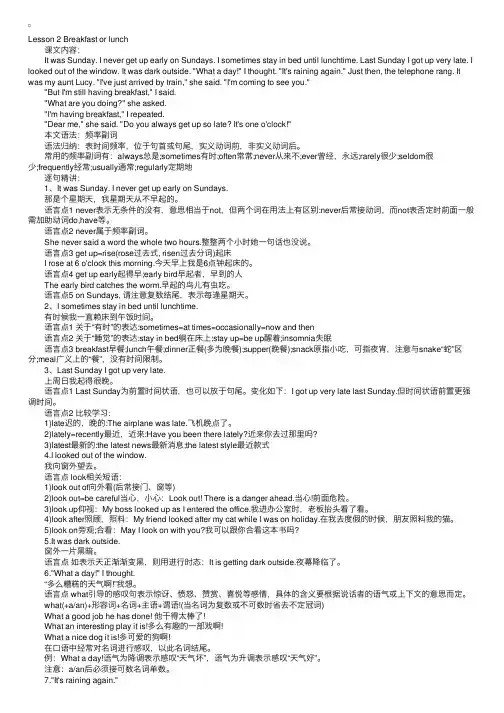
Lesson 2 Breakfast or lunch 课⽂内容: It was Sunday. I never get up early on Sundays. I sometimes stay in bed until lunchtime. Last Sunday I got up very late. I looked out of the window. It was dark outside. "What a day!" I thought. "It's raining again." Just then, the telephone rang. It was my aunt Lucy. "I've just arrived by train," she said. "I'm coming to see you." "But I'm still having breakfast," I said. "What are you doing?" she asked. "I'm having breakfast," I repeated. "Dear me," she said. "Do you always get up so late? It's one o'clock!" 本⽂语法:频率副词 语法归纳:表时间频率,位于句⾸或句尾,实义动词前,⾮实义动词后。
常⽤的频率副词有:always总是;sometimes有时;often常常;never从来不;ever曾经,永远;rarely很少;seldom很少;frequently经常;usually通常;regularly定期地 逐句精讲: 1、It was Sunday. I never get up early on Sundays. 那是个星期天,我星期天从不早起的。

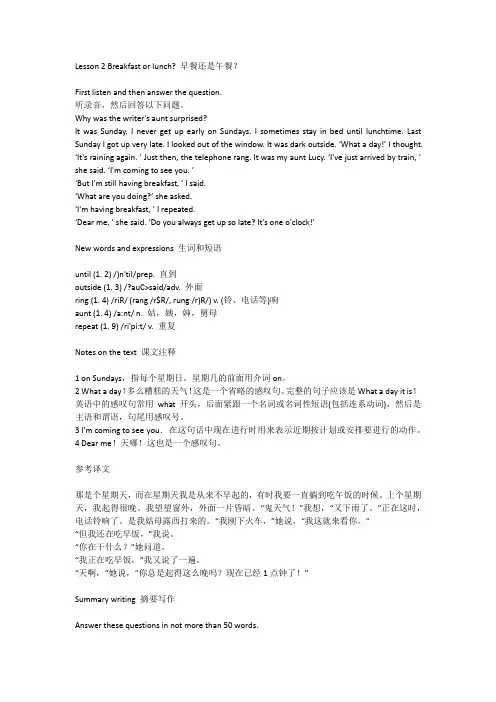
Lesson 2 Breakfast or lunch? 早餐还是午餐?First listen and then answer the question.听录音,然后回答以下问题。
Why was the writer's aunt surprised?It was Sunday. I never get up early on Sundays. I sometimes stay in bed until lunchtime. Last Sunday I got up very late. I looked out of the window. It was dark outside. ‘What a day!’ I thought. ‘It's raining again. ’ Just then, the telephone rang. It was my aunt Lucy. ‘I've just arrived by train, ’ she s aid. ‘I'm coming to see you. ’‘But I'm still having breakfast, ’ I said.‘What are you doing?’ she asked.‘I'm having breakfast, ’ I repeated.‘Dear me, ’ she said. ‘Do you always get up so late? It's one o'clock!’New words and expressions 生词和短语until (1. 2) /)n'til/prep. 直到outside (1. 3) /?auC>said/adv. 外面ring (1. 4) /riR/ (rang /r$R/, rung /r)R/) v. (铃、电话等)响aunt (1. 4) /a:nt/ n. 姑,姨,婶,舅母repeat (1. 9) /ri'pi:t/ v. 重复Notes on the text 课文注释1 on Sundays,指每个星期日。
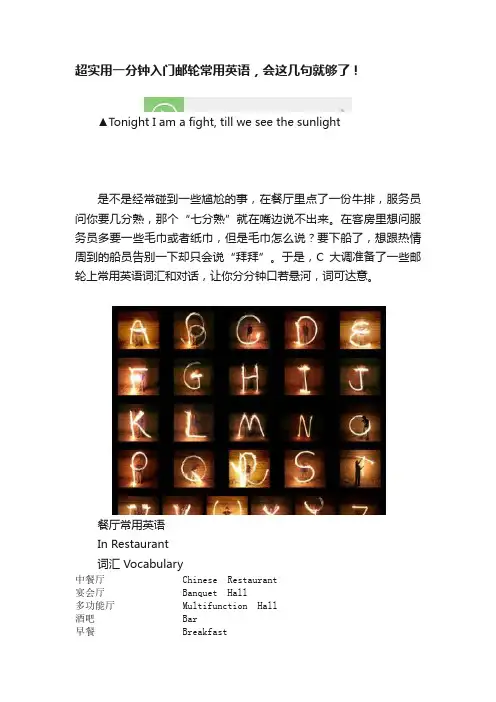
超实用一分钟入门邮轮常用英语,会这几句就够了!▲Tonight I am a fight, till we see the sunlight是不是经常碰到一些尴尬的事,在餐厅里点了一份牛排,服务员问你要几分熟,那个“七分熟”就在嘴边说不出来。
在客房里想问服务员多要一些毛巾或者纸巾,但是毛巾怎么说?要下船了,想跟热情周到的船员告别一下却只会说“拜拜”。
于是,C大调准备了一些邮轮上常用英语词汇和对话,让你分分钟口若悬河,词可达意。
餐厅常用英语In Restaurant词汇 Vocabulary中餐厅Chinese Restaurant宴会厅Banquet Hall多功能厅Multifunction Hall酒吧Bar早餐Breakfast午餐Lunch晚餐Supper正餐Dinner自助餐Buffet营业时间Business Hour 中餐Chinese Food 餐后甜点Dessert菜单/牌Menu筷子Chopsticks刀Knife叉Fork汤匙Spoon茶壶Teapot台布Tablecloth餐巾Napkin牙签Toothpick开瓶器Bottle Opener 冷的Cold香的Fragrant干的Dried新鲜的Fresh冰的Iced辣Hot甜Sweet苦Bitter咸Salty酸Sour浓Thick淡Light脆Crisp味道好的Tasty/Delicious 嫩Tender硬Hard软Soft烧焦的Burned多汁的Juicy熟透Welldone七分熟Medium Well 五分熟熟Medium三分熟Rare烙/烘Bake炸Deep Fry煎Fry烘烤Roast烩Stew煮Boil灸烤/扒Grill焖/炖Braise清蒸Steam熏Smoke腌Pickle调味品Spices芥末Mustard醋Vinegar酱油Soy Sauce花生油Peanut Oil蕃茄酱Tomato Sauce 辣椒酱Chili Sauce 黑胡椒Black Pepper 糖Sugar葱Chive蒜Garlic姜Ginger韭菜Leek盐Salt牛肉Beef牛柳Loin火腿Ham香肠Sausage猪肉Pork羊肉Mutton鸡Chicken火鸡Turkey鸭Duck虾Shrimp龙虾Lobster蟹Crab蛋Egg牛奶Milk主食Staple Food 大米Rice蔬菜Vegetable水果Fruit红茶Black Tea绿茶Green Tea果汁Fruit Juice 矿泉水Mineral Water 百事可乐Pepsi可口可乐Coca Cola七喜Seven Up雪碧Sprite啤酒Beer葡萄酒Wine威士忌Whisky白兰地Brandy对话 DialogueW(waiter): Sir/madam, would you like the table by the window or near the corridor?服务员:先生/小姐,您喜欢靠窗还是靠过道的桌子?G(guest): By the window, please! (By the corridor, please!)顾客:靠窗的。
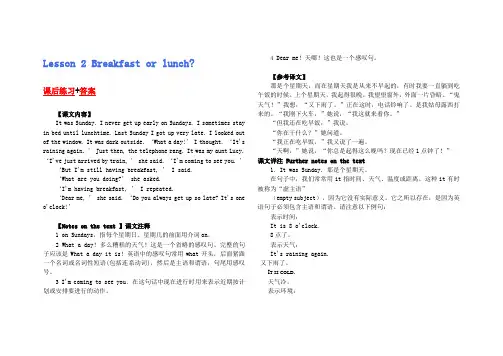
Lesson 2 Breakfast or lunch?课后练习+答案【课文内容】It was Sunday. I never get up early on Sundays. I sometimes stay in bed until lunchtime. Last Sunday I got up very late. I looked out of the window. It was dark outside. ‘What a day!’ I thought. ‘It's raining aga in. ’ Just then, the telephone rang. It was my aunt Lucy. ‘I've just arrived by train, ’ she said. ‘I'm coming to see you. ’‘But I'm still having breakfast, ’ I said.‘What are you doing?’ she asked.‘I'm having breakfast, ’ I repeated.‘Dear me, ’ she said. ‘Do you always get up so late? It's one o'clock!’【Notes on the text 】课文注释1 on Sundays,指每个星期日。
星期几的前面用介词on。
2 What a day!多么糟糕的天气!这是一个省略的感叹句。
完整的句子应该是What a day it is!英语中的感叹句常用what开头,后面紧跟一个名词或名词性短语(包括连系动词),然后是主语和谓语,句尾用感叹号。
3 I'm coming to see you.在这句话中现在进行时用来表示近期按计划或安排要进行的动作。
海论英语之我的生活英语口语第1课:我的一天常用词汇:wake up 睡醒get up 起床go to the bathroom 去浴室have a shower 淋浴bruth my teeth 刷牙wash my face 洗脸get dressed 穿衣服listen to the CDs/MP3 听CD/MP3read the newspaper 看报纸have breakfast 吃早餐go to school去学校go to work 去上班have lunch 吃午饭go home 回家make dinner 做晚饭phone a friend 打电话给朋友get on line 上网plag computer games 玩电脑游戏often 经常usually 通常sometimes 有时never 决不2、常用句子I usually get up at 7 o'clock.我一般7点起床。
Today I got up at 8:30. Because it's Sunday.因为是星期天,所以我8:30起床。
I normally wash my face and brush my teeth at 7:15 a.m.我一般在早晨7:15洗脸刷牙。
I usually eat breakfast at 7:30.我一般上午7:30吃早餐。
I usually have an egg, milk and orange for breakfast.我经常吃1个鸡蛋,牛奶和桔子。
I go to work/school by bus.我搭巴士上班/上学。
I often drive to work.我经常开车去上班。
I like to have a sleep after lunch.午饭后我喜欢小睡一会儿。
Sometimes I just do nothing.有时候我什么也不做。
Lesson2breakfastorlunch教案教学设计(外研版英语八年级)Step1: Review & Lead in (20)1.1 Text-reading & Recitation checking1.2 ReviewKey words:private (adj)----私人的/privacy(n)隐私/conversation 谈话/attention (n) 注意 /interested感兴趣的 /interesting 令人感兴趣的/business 事情,生意Key grammar:一般过去时和过去进行时的比较1)时间上的区别2)一般过去时表过去某个时间发生的动作或状态,强调动作的发生或状态的存在。
过去进行时表过去某个时刻或某段时间内正在进行的动作,强调动作的进行时。
1.3 Lead in ( Discuss the following questions with the students )1) How do you spend your weekend morning, stay in bed or do other things?2) In your daily life, whether you do not take your breakfast due to your late rise?3)When do you usually get up on weekends? Why do you get up late or early?4) Could you tell me the bad benefits the lack of breakfast would arouse?Step2:Explanation (25)2.1 Picture-ScanP1: Look at the clock ,what time is it ? What was I doing?P2: I looked out of the window ,what happened?P3: Look at me, what did I do? Who was the woman? What did she do?P4: Last, we can see the aunt was with a surprised face. So, what were they talking about?2.2 Words & Expressions★ring【英文注释】the sound of a bell ringing--E. A. Poe ; make (bells) ring, often for the purposes of musical edification 打电话,戒指,铃响【短语及搭配】a wedding ring 结婚戒指be in the ring for 参加...的竞选【例句展示】The telephone is ringing. 电话响了。
Lesson2Breakfast or lunch?Why was the writer’s aunt surprised?It was Sunday.I never get up early on Sundays.I sometimes stay in bed until lunch st Sunday,I got up very late.I looked out of the window.It was dark outside.‘What a day!’I thought.‘It’s rainy again.’Just then,the telephone rang.It was my aunt Lucy.‘I’ve just arrived by train,’she said.‘I’m coming to see you.’‘But I’m still having breakfast,’I said.‘What are you doing?’she asked.‘I’m having breakfast,’I repeated.‘Dear me!’she said.‘Do you always get up so late?It’s one o’clock.’【单词讲解】1.until prep.直到...时候until lunchtime直到午餐时间until now直到现在until recently直到最近until the last moment直到最后一刻2.outside adv.外面inside adv.里面upside adv.上面upside down上下颠倒(→L26)3.ring v.(铃、电话等)响n.铃;圆形、环形的东西(→L70);戒指r i ng-r a ng-r u ngs i ng-s a ng-s u ngdr i nk-dr a nk-dr u nksw i m-sw a m-sw u mbeg i n-beg a n-beg u n4.repeat v.重复(re-再一次)re tell再告诉一遍,重述re write再一写遍,重写re discover再一次发现(→L66)re broadcast再一次播放,重播备注:口语中,想让对方“重说一遍”时,不用repeat,这样说不礼貌。
Breakfast 早餐吃得好 – 3月24日Hello and Welcome to English World. This is your friend Mark.歡迎你來到《英语世界》。
I am your friend Guo Wen-Jie.Listener friends, are you a morning person?聽友,你是個早起的人嗎?Everyone knows that I am an early riser.我們都知道馬可向來起得很早。
I wake up everyday at around 5 o’clock.他每天差不多五點就起床了。
That’s quite early.Don’t forget, I start work at 6.平常時候他六點就上班了。
This has been my habit for years.他有這個習慣已經多年了。
Do you want to know my secret to getting a good start in the morning?想知道他早上活力充沛的秘訣嗎?Sure. Tell us.I eat a good breakfast everyday.原來他每天都吃豐富的早餐。
I see.How about you, Wen-Jie?What about me?I know you are a night person.對了,我向來喜歡晚睡。
I am not a morning person.Sometimes you do look sleepy in the morning.早晨上班時,我有時還是睡眼惺忪 and I feel tired, too. 也常常覺得累。
Well, do you eat breakfast?Huh, I usually skip breakfast. 多半時候我不吃早餐。
I am always in ahurry 總都是在趕時間嘛。